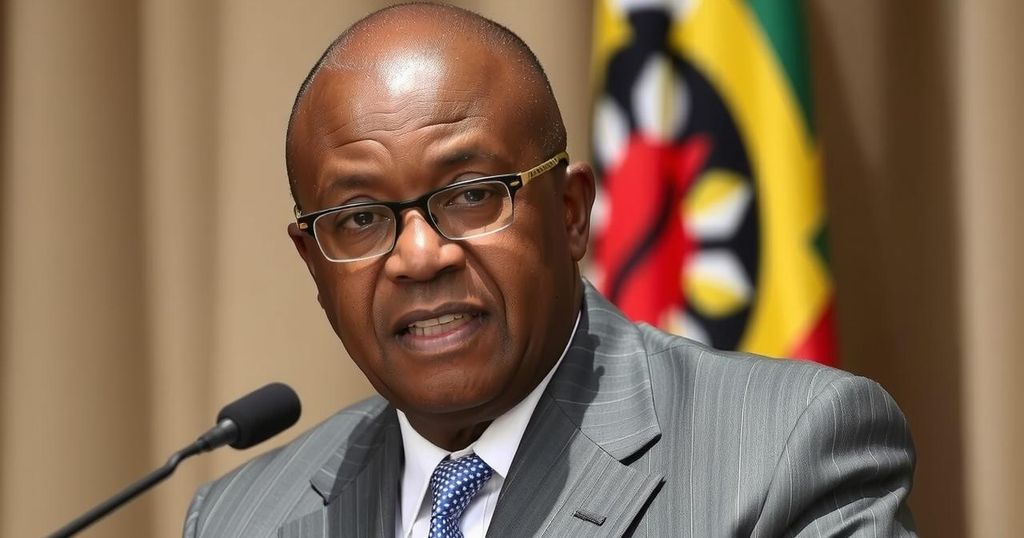Kenyan President William Ruto has vowed to halt the abductions of government critics after a surge in disappearances linked to protests against a finance bill. Previously dismissing such claims as false, Ruto’s recent remarks reflect growing public pressure. Amid activist concerns over accountability, families of the missing continue to seek answers as they await action from the government.
In a significant shift, Kenyan President William Ruto has pledged to cease the abductions of government critics, directly responding to a disturbing surge in disappearances that began following protests against a contentious finance bill in June. Until now, Ruto’s administration has denied any such incidents occurred, labeling them as misinformation intended to undermine the government. Contradicting earlier assertions, the President acknowledged the issue during a speech, urging parents to monitor their children more closely while insisting on the need for discipline among the youth.
Reports indicate that at least 82 government critics have gone missing, with allegations that they have been targeted by government intelligence. Notably, two young men are among the vanished for their provocative social media posts related to Ruto. While some individuals have reappeared, human rights advocates report that 29 remain unaccounted for, raising concerns over government accountability. Nurtured by a climate of fear, the protests have catalyzed a mobilization effort that highlights underlying frustrations regarding governance, corruption, and a stagnant economy.
Bob Njagi, a prominent activist who claims to have been abducted, expressed skepticism over Ruto’s assurances, interpreting them as recognition of the issue rather than a genuine commitment to change. He recounted his own harrowing experience of abduction, which included torture and isolation, exemplifying the dire circumstances faced by many individuals involved in activism. Echoing Njagi’s sentiments, Opposition Senator Okiya Omtatah emphasized the state’s complicity in these disappearances, suggesting a systemic issue permeating Kenya’s security apparatus.
Despite the Chief Minister’s previous denials about the existence of abductions, local leaders and activists continue to call for accountability and transparency from law enforcement regarding the allegations. Many families of the missing are left in distress, holding out hope that President Ruto’s promises will materialize into action that ensures the safe return of their loved ones. Civil society groups have condemned the government’s actions, drawing parallels to historical patterns of repression and censorship in the country.
As the situation unfolds, the efficacy of Ruto’s commitment will be closely monitored, with looming questions regarding the overarching culture of fear and repression in Kenya’s current political climate. The conflicting narratives from government officials and activists signal a critical juncture for human rights in the nation.
Overall, the recent statements from President Ruto could be viewed as a pivotal moment, suggesting potential shifts in policy that might address the rampant issues of abduction and enforced disappearance in Kenya, yet skepticism remains prevalent among critics who have endured trauma firsthand.
In Kenya, a wave of disappearances has raised significant alarms surrounding government practices and human rights. Various reports indicate that activists, opposition figures, and individuals critical of the government have been targeted and subjected to abductions by unidentified agents, purportedly linked to government intelligence. The alarming trend correlates with widespread protests against political decisions, particularly concerning economic policies that have left many disillusioned with the ruling administration. As civil society organizations amplify their calls for accountability, the government’s previous strategy of denial is now challenged by public scrutiny and rising demands for transparency.
In conclusion, President Ruto’s recent commitment to addressing the crisis of abductions represents a notable shift in response to public and international pressure. However, tangible actions will be crucial in restoring trust among the populace, particularly for those families enduring the anguish of unresolved disappearances. As Kenya stands at a crossroads, its commitment to human rights and accountability remains under vigorous examination.
Original Source: www.cnn.com






